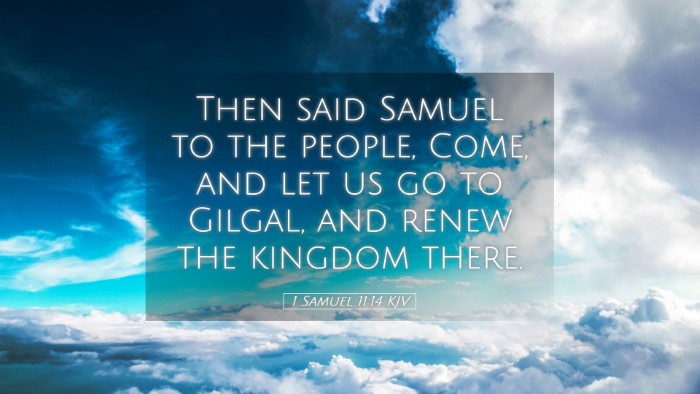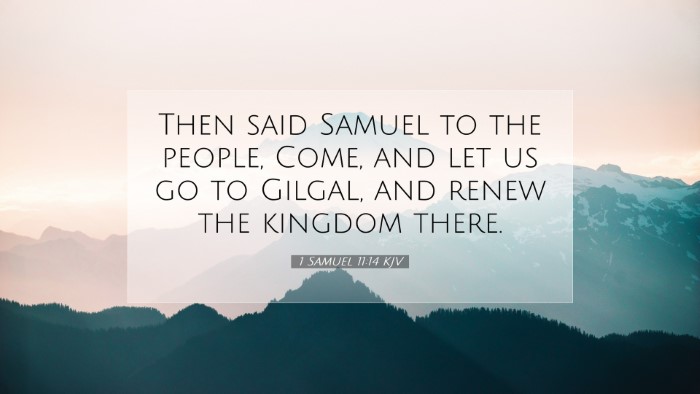Commentary on 1 Samuel 11:14
Bible Verse: 1 Samuel 11:14 - "Then said Samuel to the people, Come, and let us go to Gilgal, and renew the kingdom there."
Context and Background
1 Samuel 11 recounts a pivotal moment in Israel's history where Saul, having been anointed king, faces imminent threat from the Ammonites. This chapter is significant for the establishment of Saul's kingship, and it emphasizes the importance of divine approval for leadership.
The Renewal of the Kingdom
This verse marks a key transitional moment where Samuel calls the people to Gilgal to formally renew Saul's kingship in light of the recent victory over the Ammonites.
- Importance of Gilgal: Gilgal was a site of great significance in Israelite history, symbolizing the place where the Israelites first camped after crossing the Jordan River. This location carries with it a renewed understanding of God's promises and the foundations of the Israelite nation.
- Renewal of the Kingdom: The act of gathering to renew the kingdom suggests a recommitment to God's sovereign rule. It indicates a collective acknowledgment of divine authority in the leadership of Saul.
The Role of Samuel
Samuel, a prophet and judge, steps into a critical role in this narrative. His leadership is essential for the spiritual and political direction of Israel.
- Spiritual Authority: Samuel’s calling the people reflects his spiritual role, affirming that Israel’s governance must be aligned with God’s will. His leadership serves as a reminder that earthly authority is ultimately accountable to divine standards.
- Encouragement to Unity: Samuel invites the people to unite, which is vital for the strength of the nation. This notion of unity under God’s guidance can resonate with pastoral leaders today in promoting community among their congregants.
Theological Insights
This verse is rich with theological implications for understanding God's governance and the human response to divine calling.
- God's Sovereignty: The renewal of the kingdom underscores God’s sovereignty - despite the people's choice of a king, it is God's hand that empowers the leadership. The unfolding events remind us that human kingship is subordinate to divine authority.
- Corporate Worship and Renewal: The gathering at Gilgal for renewal reflects a corporate act of worship and reaffirmation of faith. This theological theme informs contemporary practices of communal worship and the importance of public acknowledgment of God’s governance.
Practical Applications for Today
Understanding 1 Samuel 11:14 provides pastors, students, and theologians with several practical applications:
- Leadership in the Church: Just as Saul’s kingship was affirmed in the context of a community gathered for divine purpose, church leaders are reminded of the necessity of seeking God’s guidance in their leadership roles.
- Community and Responsibility: The collective renewal called by Samuel reflects the shared responsibility of the church community to uphold the standards set by God. This verse calls believers to actively engage in the health and direction of their faith communities.
- Prayer and Spiritual Preparation: The events leading to this renewal suggest the importance of prayer and spiritual preparation before taking on leadership roles or making significant communal decisions.
Conclusion
In summary, 1 Samuel 11:14 is not merely a historical marker but a profound reminder of the intertwining of divine authority and human leadership. The call to renew the kingdom at Gilgal serves as a directive for all generations to seek unity under God’s reign, to reaffirm their commitment to His standards, and to recognize the vital role of communal worship in the life of faith. For pastors, students, and theologians alike, this verse speaks of the continuity of divine engagement in Israel's history and echoes the ongoing need for spiritual renewal in the life of the Church.


